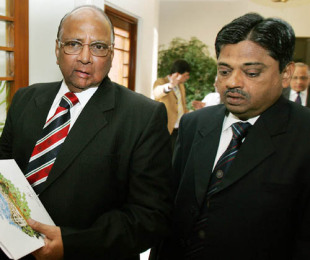The piper's new master
On India's dominance of cricket, and a book that tells of a plan to thwart it
Suresh Menon
08-Feb-2009

| ||
You don't need to have read Mike Marqusee's Anyone But England to understand the manner in which England used to treat lesser cricketing countries like India. Long after the non-white colonies gained independence, England continued to behave as if history had stopped with the ascension of Queen Victoria to the throne. But India, thanks to the emergence of some world-class players and ambitious officials (rather in the manner of England, actually) began to assert itself from the mid-1980s on.
When Sunil Gavaskar said upon first playing at Lord's that it was no big deal, an earlier generation of players and officials had apoplexy. Some years later, when he turned down membership of the MCC because it had treated him badly, many Indians could not believe it. Bishan Bedi took him to task in print for insulting Indian crickethood. The winds of change were blowing gently but only the sensitive could feel them.
As the 1990s progressed, however, the subtlety went out of the process of change, and it would have needed insensitivity of a high order not to notice that the balance had shifted. Yet it has taken an extraordinarily long time for England to acknowledge this. In a newspaper column, the former England captain Michael Atherton finally spelt it out thus:
"India are the big beast of cricket and everyone is frightened of both their bark and bite […] It was a sweeping change to the balance of power but one that took England, who didn't tour India between 1992 and 2001, a long time to appreciate.
"[…] Malcolm Speed, the chief executive of the ICC, found himself in a position much occupied by Kofi Annan and the United Nations in recent years: being bullied by a superpower for whom the notions of international law and collective responsibility have long ceased to have any meaning…"
Indian officials will react by saying that when England had the power they bullied everybody else; now that India do, it is merely payback time. Or history repeating itself. Whatever the officials feel, however, at least some of the players will not complain. It will be difficult to convince either Kevin Pietersen or Andrew Flintoff (worth 1.55 million dollars each in the IPL auction) that India is anything but the land of milk and honey.
There is a sound reason for India's dominance. About 60% of all the money generated in cricket comes from India, and it is likely that if India pulls out of the World Cup, for example, the tournament will collapse. Yet, in 1996, after what Graham Halbish, former CEO of the Australian Cricket Board called a "decidedly ugly ICC meeting in London", Australia, England, New Zealand and the West Indies were prepared to break away from the ICC.
In Halbish's book Run Out, he gives the details of "Project Snow", a "genuine option for Australia and its closest allies to counter a power play by the subcontinent and South Africa".
| Graham Halbish's book must be one of the more straightforward narrations from an official connected with the game. For if players are largely reticent, officials are usually even more so, stretching the truth only occasionally to place on record their own indispensable role in the drama that is cricket | |||
Was this done to save the game? Here's what Halbish says, "The contingency plan would allow us to keep satisfying our television networks, sponsors and crowds." Note the order.
"Project Snow would provide our group with three outcomes we believed were necessary: First, to show South Africa it had chosen the wrong side; second, to steady India and the subcontinent's quest for more influence over all matters cricket; and third, to restore balanced leadership to international cricket," Halbish writes, blissfully unaware of the irony. Is it any wonder then, that given the chance now, India are happily putting the Englands and the Australias in their place?
Most cricketing autobiographies tend to be of the "A good time was had by all, especially since Sandy our in-house clown was in top form"-type or the "I was fortunate enough to make a double-century"-type. Halbish's Run Out, subtitled "My Dismissal and the Inside Story of Cricket", focuses rather too much on the dismissal and not as much as one would have liked on the inside story. Yet it must be one of the more straightforward narrations from an official connected with the game (it is ghosted by the Aussie cricket writer Rod Nicholson). For if players are largely reticent, officials are usually even more so, stretching the truth only occasionally to place on record their own indispensable role in the drama that is cricket.
If Project Snow tells us anything, it is that angels and devils are interchangeable in cricket; today's angel is often tomorrow's devil, and both are driven by the same motive. Atherton's call would have made sense had England's hands been clean over the years. It is not unusual for the one paying the piper to call the tune.
Run Out: My Dismissal and the Inside Story of Cricket
by Graham Halbish
Lothian Books, 2003
by Graham Halbish
Lothian Books, 2003
Suresh Menon is a writer based in Bangalore